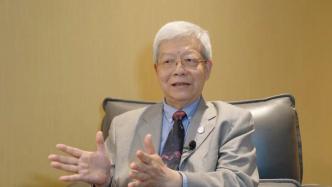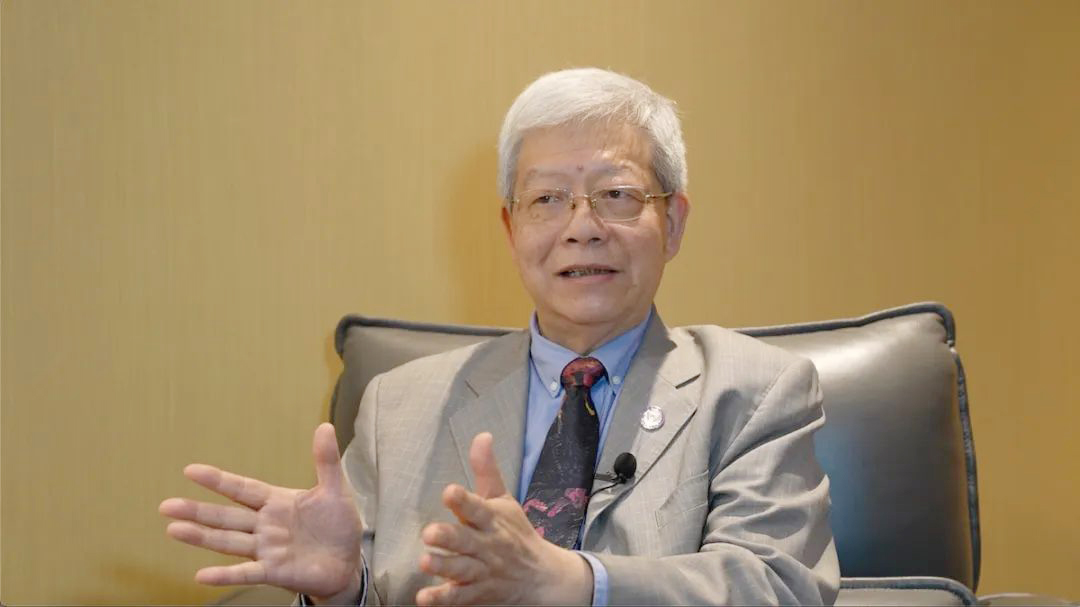

Yang Yuliang is being interviewed. Picture of Zhu Xiandong
The "Science and China" academician expert tour group recently entered the Greater Bay Area to carry out in-depth science popularization tours. At the opening ceremony of the event, Yang Yuliang, academician of the Chinese Academy of Sciences and director of the Science Popularization and Education Working Committee of the Chinese Academy of Sciences, said in an exclusive interview with China Science Daily that the time is ripe for my country to add mandatory requirements for popularization of science in project application and review .
"In the process of project declaration and review in my country, there are actually some requirements for science popularization, but these requirements are not rigid. Now (making science popularization a rigid requirement) I think the time is ripe." Yang Yuliang told the "China Science Daily" Under the background that all sectors of society have reached a consensus on the importance and importance of science popularization, there are at least three reasons for scientists to "explain the significance and contribution of the project to the society".
Yang Yuliang said that, firstly, Western society likes to say that scientists "use taxpayers' money to conduct scientific research", so it is necessary to explain to taxpayers "where the money is spent". In fact, the situation in our country is similar. Various funds and budgets for scientific research are approved by the National People's Congress and representatives of people's congresses at all levels. Therefore, scientists should also explain to the general public about the use of scientific research funds.
Second, the popularization and education of scientists is related to whether the scientific research team has successors. "If China wants to become a technological powerhouse, it needs generations of first-class scientific and technological talents. Where do first-class talents come from? From young people and children." Yang Yuliang said that popularizing science is an important way to inspire the younger generation to actively participate in scientific research. Every scientist has the responsibility to ensure that there are successors in the scientific research team in his or her field of study. Therefore, scientists are duty-bound to devote themselves to science popularization and science education.
The third aspect concerns "scientific soil". "Scientific soil simply refers to the understanding and support that the general public can give based on their understanding of scientific research." Yang Yuliang believes that a country with poor scientific soil, even if it has first-class smart heads engaged in scientific research, can produce The probability of major results is not very high; on the contrary, if a country's scientific soil is fertile and scientists can receive due support, they have more chances to achieve influential results.
"From these three aspects, it can be seen that science popularization and science education are of great significance. Recognizing this, I believe scientists should have this sense of responsibility." Yang Yuliang said that the purpose of science popularization and science education is to improve the scientific literacy of the public. It has been improved, "this is the only way for us to achieve a technological power."
Focusing on science popularization and science education, "Chinese Journal of Science" and Yang Yuliang conducted the following discussions.
"China Science Daily": When we put science popularization and science education together, what are we talking about?
Yang Yuliang: Science education is the proper meaning of science popularization. Science popularization should popularize scientific knowledge to the public, but more importantly, spread the scientific spirit. Art seeks beauty, science seeks truth, and the most important point in the scientific spirit is to seek truth and act in accordance with the laws of nature.
Popular science also advocates scientific thought and scientific method. Mathematics relies on logical deduction, and experimental science relies on inductive judgment. These are both scientific ways of thinking. Different disciplines have different laws of understanding, so when we do science popularization, we want to enable the public and educated people to fully grasp the methods of scientific research and scientific thinking. This requires strengthening science education.
"China Science Daily": Compared with the past, is the current scientific soil or scientific environment in my country more conducive to the development of science popularization?
Yang Yuliang: That's right. Technological innovation and popularization of science are the two wings of innovation and development. This is forming a broad consensus in all walks of life and laying a solid foundation for our popularization of science.
In addition, the development of modern society has increased people's demand for scientific knowledge, scientific thinking, and scientific spirit. This also provides great opportunities for science education and popularization of science, but it also poses new challenges.
"China Science Daily": What are the specific challenges to science popularization?
Yang Yuliang: In today's society, the means of information dissemination are becoming more and more abundant, which provides opportunities for some bad ideas and inductive capital to take advantage of. As a result, all kinds of information are filled with quite a lot of fake science popularization, fake science popularization, commercial marketing under the guise of popular science popularization, etc. At the same time, due to lack of scientific literacy, many of the media, which should have been responsible for destabilizing the turbid and purifying the clean, not only failed to block the "noise" in time, but instead created more confusion. This is an aspect worthy of attention.
We haven't found a good way to "tell" the public which articles are trustworthy and which are not. We are still studying this aspect, and at the same time we are preparing to introduce a specification on scientific and technological reports to help the media report scientific and technological achievements objectively.
"China Science Daily": How should scientists tell scientific stories? In other words, a scientist is not naturally an expert in popularization of science. What efforts does it take to become a master of popularization of science?
Yang Yuliang: To become a science popularization expert, a scientist needs to "practice". This is why I feel that the time is ripe for our country to add mandatory requirements for science popularization in project declaration and review—scientists must gradually master this ability and assume the responsibility for science popularization.
From the perspective of becoming a science popularization writer or science popularization expert, in addition to being very familiar with domain knowledge, I think there are several requirements.
First, not only must be familiar with the knowledge of the field of popular science, but also have a certain degree of understanding of surrounding subjects within the scope of science. If human scientific knowledge is a landscape, you also need to understand the location of this "mountain" and the surrounding "landform".
Second, scientists who can do a good job in science popularization generally have relatively high philosophical literacy. Many excellent scientists will more or less live out some "philosophical meaning" in the end. I think this is not because they can't do scientific research anymore, but because they have more thinking. Moreover, only when a scientist has basic philosophical concepts can he catch up with the express train instead of losing his way when science changes. At the same time, having philosophical thoughts is very helpful for understanding science.
Third, there must be a certain literary or artistic accomplishment, just as many scientists in the field of basic science have a good mathematical accomplishment. Mathematics is a language for describing science, but this language is only familiar to a small number of people, and for the public, a literary and artistic language is needed. Especially now that information dissemination has various forms of expression such as video and animation, which puts forward higher requirements for scientists.
"China Science Daily": To do a good job in science popularization, you must have these three qualities at the same time, so the requirements for scientists are quite high.
Yang Yuliang: Indeed. We (referring to the Science Popularization and Education Work Committee of the Chinese Academy of Sciences) are discussing this issue with relevant departments of the Ministry of Education, hoping to improve the quality of this aspect in schools, especially universities. In the future, we will cooperate with relevant departments to promote this matter.
At this stage, I think scientists can cooperate with technology media reporters, professional writers, and even literary and art workers to tell scientific stories and popularize science well. This is achievable, for example, Hawking's "A Brief History of Time", it is difficult for Hawking alone to achieve such a high level of completion, and the text editor behind it has played a big role.
"China Science Daily": A few days ago, the official website of the Ministry of Science and Technology issued the "Announcement on Publicly Soliciting Opinions on the Law of the People's Republic of China on Science and Technology Popularization (Draft Amendment)". The revised draft specifically makes improvements on "establishing science popularization awards", "establishing a professional science popularization staff team", and "improving the evaluation and incentive mechanism for science popularization personnel". What do you think about this?
Yang Yuliang: It is very important to "improve the evaluation and incentive mechanism for science popularization personnel". I think that for most scientists, the level of scientific research is parallel to the level of science popularization and science education. Generally, first-class scientists are actually potential science popularizers. So under such a premise, what is the more important thing for a country? It is to make researchers regard science popularization as an intrinsic impulse rather than a utilitarian activity.
I think that excellent scientists generally have two inner impulses, one is the impulse to explore the unknown in scientific research, and the other is the impulse to describe new trends in the professional field to others.
According to my observation, even taciturn scientists will become very active and talkative once the topic involves professional fields. This is the inner impulse to do science popularization. How do we bring out this inner impulse? My point of view is that it's okay if you can't support them, but don't put up obstacles for them, don't limit them.
"Chinese Journal of Science": Do not set up obstacles, what do you mean?
Yang Yuliang: For example, some utilitarian evaluation indicators limit them. Scientists are often overwhelmed with projects, papers, awards, etc. These are the obstacles. There is also a kind of unhealthy trend of thought, which believes that only those who do not do well in scientific research will do science popularization, which is also an obstacle.
"China Science Daily": What do you think is the internal reason behind this? How to resolve it?
Yang Yuliang: I once mentioned a concept - "unit utilitarianism". The unreasonable evaluation index for a scientific researcher comes from the unreasonable evaluation index for a scientific research unit; the unreasonable evaluation index for a scientific research unit comes from the unreasonable evaluation index for a department... "Unit utilitarianism" seems to be It is far away from the front-line scientific research personnel, in fact, this kind of influence is very great.
So the question boils down to how to manage the team of scientists. Kenneth Wilson, the winner of the Nobel Prize in Physics in 1982, was almost dismissed by the school board of directors for "not outstanding achievements", but the then principal chose to believe in him and did not interfere too much with him. A few years later, Wilson achieved a blowout, and later won the Nobel Prize.
What does this typical case illustrate? I personally think that for scientific researchers, if they choose to trust him, they must know when to take care of it and when not to take care of it. The management of the team of scientists is an art. It is a very important basic work and a major issue to design the management of scientists in accordance with the objective and inherent laws of scientific development and around the proposition of how to maximize the effectiveness of the team of scientists.
(The original title was "Academician Yang Yuliang: "The time is ripe" for project applicants to do science popularization")